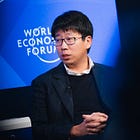This article is part of Fintech Leaders, a newsletter with almost 70,000 builders, entrepreneurs, investors, regulators, and students of financial services. I invite you to share and sign up! Also, if you enjoy this conversation, please consider leaving a review on Apple Podcasts or Spotify so more people can learn about us.
Kamran Zaki is a Partner at ICONIQ Growth and former COO of Adyen. ICONIQ growth is a multi-billion fund that has backed dozens of amazing companies, 27 of which have IPOd and together comprise a market cap of over $1.5T. Some of their fintech investments include Adyen, Chime, Ramp, Robinhood, Monzo and Bill.com.
In this episode, we discuss:
What it means to be a value-add investor and VC
“What you want as a company from your investors is that they're with you through thick and thin.”
Kamran spent a decade on the board of Adyen, working with the company’s investors and independent board members. He saw what a truly value-add investor looks like and he defines it as one who commits to the long-term journey of a company, standing firm during challenging periods as well as celebrating successes together. For him, the true measure of an investor’s worth lies in their ability to support teams through adversity, offering unwavering support and becoming an integral partner in navigating the inevitable bumps along the way. In addition, great investors contribute with strategic introductions to potential customers, identifying and recruiting executive talent, and connecting founders with other experienced entrepreneurs at critical growth junctures. Now at ICONIQ Growth, he aims to be known for an ethos of "uncommon care," where investors earn their place through meaningful engagement, creating not just financial returns but a ripple effect of knowledge and mentorship.
Lessons from Adyen - the keys and challenges of building a truly global company
“Definitely always looking for great companies in general, but if they have global applicability, then I think that's one even more exciting but also, selfishly, it makes the opportunity even bigger.”
As a company leader, having a global vision is especially important for Kamran, when solving problems with broad applicability. At Adyen, one of the most global companies in fintech, this meant addressing the local complexities of operating across many geographies—diverse payment methods, local regulations, and several currency flows—while helping customers scale internationally. Solving these global challenges not only provides more value to customers but also significantly expands the market opportunity for the company and can lead to larger outcomes.
But going global is not for everyone. It requires disciplined execution when building across borders. How did Adyen do it? According to Kamran, the company’s success was rooted in excelling at specific areas—initially focusing on digital payments before expanding into Unified Commerce, platform solutions, and embedded financial products. Leaders, he mentions, must balance ambition with focus, prioritizing the opportunities that will enable their company to differentiate and thrive in a competitive landscape and then expanding through adjacencies.
Taking Adyen public and lessons for company leaders looking to IPO in the coming years
“When I joined PayPal in 2004 when we would go to talk to large financial institutions around the world about partnering with them, we used to have to spend the first half hour educating them on what PayPal was.”
Back in 2018, Adyen went public with a ~$8Bn market cap. Kamran was then President of the company’s North America fast growing operation and was closely involved in the IPO process. For Kamran, going public should not be seen as an endpoint but as a milestone in a larger journey. The IPO is an opportunity to invite new investors into that vision while remaining committed to delivering future growth and value. In fact, ever since Adyen went public, the company’s market cap has grown over 6x.
Kamran also cautions leaders against losing focus during the IPO process. Execution is paramount—leaders should prioritize the most critical goals and avoid being distracted by “shiny new objects.” The short-term market pressures might tempt you, but he believes excelling in a few key areas, rather than spreading efforts too thin, is vital for standing out in competitive markets and maintaining momentum post-IPO.
Traits and patterns of great leaders, Kamran’s take on stablecoins… lots more!
Having worked in leadership roles at PayPal, Netflix, and Adyen, Kamran Zaki has collaborated with some of the most iconic leaders of tech and fintech. He is convinced great leaders are defined by their ability to channel an intense focus on solving specific, often complex problems. They possess a long-term vision and a willingness to overcome skepticism and obstacles, all while rallying other leaders and team members to coalesce around a shared mission. Moreover, humility is a hallmark they all share—they emphasize the "we" over the "I" and recognize that success stems from the collective strengths of a complementary team.
He also talks about the importance of pragmatic prioritization, particularly in environments where something else is “hot” and excitement over the next big thing can seem tempting. Great leaders, he notes, focus on solving two or three critical problems at a time, maintaining a balance between innovation and delivering value to existing customers. His belief in the complete life cycle of product management—launching, iterating, scaling, and sunsetting—is core to his philosophy that enduring success comes from adding tangible value while managing complexity.
Want more podcast episodes? Join me and follow Fintech Leaders today on Apple, Spotify, or your favorite podcast app for weekly conversations with today’s global leaders that will dominate the 21st century in fintech, business, and beyond.
Previous Episodes You May Enjoy:


























Share this post